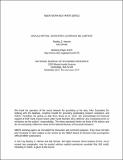Should retail investors’ leverage be limited?
Author(s)
Heimer, Rawley; Simsek, Alp
DownloadAccepted version (510.1Kb)
Publisher with Creative Commons License
Publisher with Creative Commons License
Creative Commons Attribution
Terms of use
Metadata
Show full item recordAbstract
© 2018 Does the provision of leverage to retail traders improve market quality or facilitate socially inefficient speculation that enriches financial intermediaries? We evaluate the effects of 2010 regulations that cap leverage in the U.S. retail foreign exchange market. Using three unique data sets and a difference-in-differences approach, we document that the leverage-constraint reduces trading volume by 23%, alleviates high-leverage traders’ losses by 40%, and reduces brokerages’ operating capital by 25%. Yet, the policy does not affect the relative bid-ask prices charged by the brokerages. These results suggest the policy improves belief-neutral social welfare without reducing market liquidity.
Date issued
2019Department
Massachusetts Institute of Technology. Department of EconomicsJournal
Journal of Financial Economics
Publisher
Elsevier BV